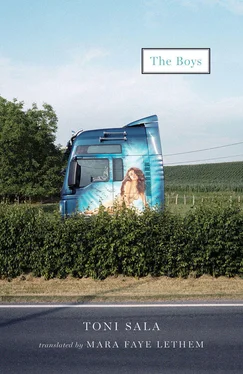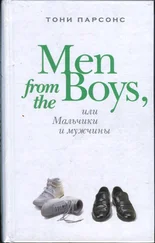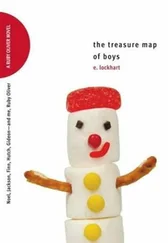“Let’s go to a room,” he said.
Learn to live for once. For once, learn to think about your family from many floors up or down, move away from the windows, learn to live without them for the day you’ll have to leave, for the day they leave.
In the girl’s room there were towels from the shower and scattered clothes. Some pants, a skirt, and a blouse. The furniture in there was new too, and there was nothing hanging on the walls. They didn’t live here. But the door to the closet was half open, revealing colorful dresses and shoes.
The girl drew the curtains and turned off the light. The room was left quite dark. He took off his clothes, imitating her. He got into the bed. He was embarrassed by his body. The age difference was obscene, and he would have preferred she approach him dressed, because he also desired her clothes. She wore a purple lingerie set. She had a tattoo at the base of her neck, ivy that went down the middle of her back.
“Are you okay?” she asked.
“Close the door. Don’t talk.”
“All right, but close your eyes.”
Ernest closed his eyes and waited. The bed started to warm up, the sheets were clean; no one had slept there.
He heard the trucker laugh on the other side of the door. What was taking her so long? Was she going to get into bed with him or pull the covers off him?
Women don’t know their power, nor how to depersonalize that power. The less they are like themselves, the stronger they are. The girl moved around the room, but he resisted opening his eyes until he remembered that he had left his wallet in his pants, with his ID and four fifty-euro bills.
He opened his eyes. He saw some sort of angel in front of the wardrobe. He closed his eyes and opened them again. The girl smiled in the half-light. She was wearing the purple lingerie set, the earrings, and some white wings with plastic feathers.
He had seen those wings in Vidreres, in the window of the sex shop, and now he understood why there was a sex shop in a small, rural town like Vidreres: for prostitutes and their clients.
It seemed like everything was becoming clear.
“Tell me one thing,” he said. “What did you do this morning?”
The girl didn’t answer. She knew the two boys. She was in the square, she was at the church, she had accompanied them to the cemetery.
“Answer me.”
“You told me not to talk.”
The wings were as violent and awkward as plowshares. The girl knew the two dead boys. Both girls knew them. How could they not? They were the same age. Everyone had gone to the funeral.
“Where were you earlier today?”
The girl no longer laughed.
“What do you care?”
He got up from the bed. His daughters had grown up, and he’d had to learn not to raise his hand to them. But there were moments when you had to. When you have children you spend your life risking your dignity. Your existence lies in the hands of someone else. That’s what children are. They destroy you. There should be some way to retire after having them. Retire from being a parent. Since there isn’t, you have to stay in shape to deal with them. Deal with your children; deal with the young. The girl could have been his daughter. And just as he would have with his daughters, he got up from the bed and planted himself in front of her. One more rude remark and he’d slap her.
“Get back in bed,” she said. She had lowered her gaze. “Get back in bed, will you? Close your eyes again. . try to relax. . We were out — in the winter this place is dead — we were in Barcelona earlier, at a gym, if you really want to know. Okay? Do you mind? What’s wrong with you? This was a special surprise for you.”
She meant the wings. Ernest got back in bed and closed his eyes. The girl lay down beside him. She kissed him on the cheek like a daughter, until he turned toward her and opened his eyes and hugged her and stroked her. She had taken off the wings but still wore the lingerie set, and she was smiling again. Innocent as animals, he thought. They live in Barcelona, they come up here to work, and then they go back. It’s a parenthesis. An upper floor. They are named Clara or Sònia or Judit, and they go out with boys who take them to the gym and know nothing about all this. Or do know and stay out of it. They live with their parents. They go to college.
He let his eyelids drop again, letting his hands take the lead, he felt her and went to her sex as was his wont — headfirst into the river — and the shock was as imminent as the tree trunk was for the two brothers. Knock up your daughter, make her a mother and grandmother, take her out of the running. Lives kept coming and going and now a new one shows up. The accident hadn’t cut short a long life, but rather two short lives that had yet to branch out: pure miscarriages. It was nothing. He put his hand on her sex, proof that the living are made to be with each other, the bodies themselves deformed to fit together — needing to talk, sometimes, on their own. Not even pregnancy lets us escape that. It was death, what brought them together. All bodies, dead or alive: plants, rocks, horses, and mountains. They followed the sway of sex, the movement of skeletons, as if it could shut off their consciousness and give comfort in the company of a shared night. But the more he wanted to get those thoughts out of his head, the more they imposed themselves. It seemed he might shake them off with a violent lurch, but he knew he couldn’t, his head was loaded down with years, with floors and stairwells, each day the same as the last, all the boredom that must have started one day — perhaps when he signed his first contract to work at the bank — the desperate life of an older man, everything ending, just remnants, Mondays waiting for Fridays, Fridays waiting for Mondays, and, thank you ever so much; when he retires he won’t even have that. The dead fell from the trees onto the boredom of the living, and every once in a while a muffled clarification: the temptation of suicide, sometimes like a compassionate light and sometimes like a bitter, soiling cowardice. Waiting behind soundproof glass and waiting, not doing anything but waiting. Meanwhile, on top of him — with reins and a crop, sinking spurs into his belly, riding him at a gallop until he’s worn out — is his own tedium, the exhaustion of him as a person.
But now the tedium had been cracked open. He had wished for a car accident a thousand times, as a reward for all those trips to Vidreres. And those two poor kids had the accident. The two young brothers had the accident. They’d mocked him. Here he had the consolation of the girl they left behind. If she hadn’t showed up in those wings, maybe Ernest would have told her what he wanted: pain. Not wings, but shoes. Shoes leaving tread marks, rubber tracks on his back, the conscious braking. A payment for being here, for remaining, for having escaped the car in place of the brother who was driving.
He filled his hands with the girl’s flesh, and his eagerness was because the dead wanted sex: it was a child’s game, religious, familiar, and worn. He opened his eyes and finished undressing her, and he didn’t care anymore about being under the sheets. Guilt is the marrow in life’s bones, the only consistent thing in life, blessed, beloved guilt, the material we are made of, the dead, children, parents of the dead, their deaths a gift from our unconscious, and it was becoming urgent that he ejaculate. He ran his hand over the girl’s straight hair, shiny and clean, with the grooves from the comb visible, still damp, and he looked around the bed for satellites of her, pieces of clothing, her purse, dresses, shoes — the shoes he would have liked to feel on the skin of his back, hard and painful enough to keep him from thinking — the vanity case, the silvery cell phone, the short jacket that would end up at the back of the closet and then in the trash, and which she’d see someday, when she was his age, in the photographs of her youth, like his daughters will see him in photos after he’s dead.
Читать дальше












